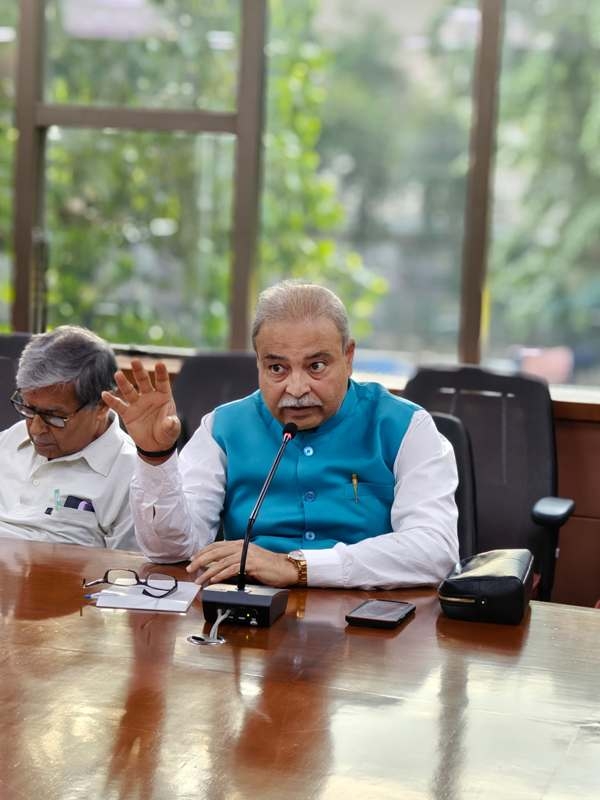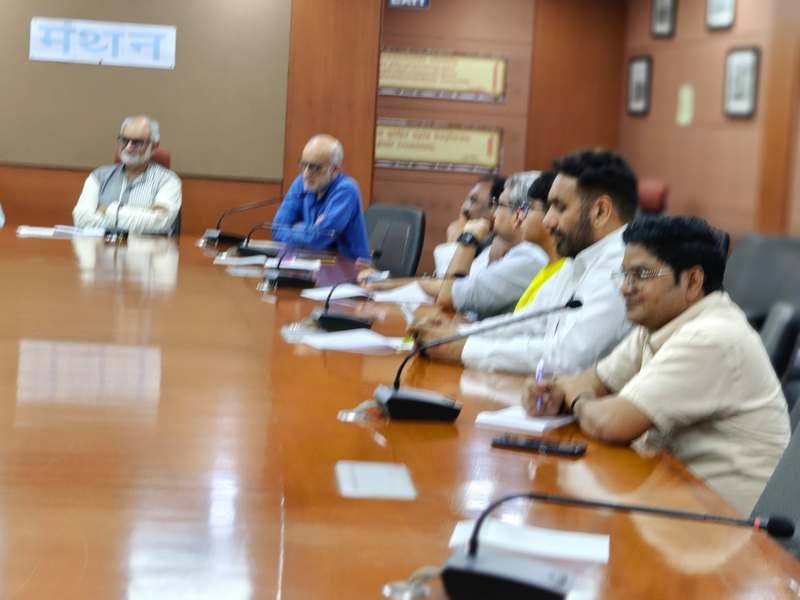Round Table Discussion on "Post-Truth Politics in Current Times"
15 Jul 2024 10:49:23
Round Table Discussion on "Post-Truth Politics in Current Times"
July 13, 2024.
In recent times, public opinions are shaped more by half-truths, which make emotional impact on the masses, than by objective facts. This phenomenon, often termed as post-truth, has become a significant element of political discourse globally. To understand its impact on India's political environment, India Policy Foundation organised a roundtable discussion on "Post-Truth Politics in Current Times" on July 13, 2024.

Beginning the discussion, the topic was introduced by Dr Sachchidanand Joshi, a renowned author and academician, who is also the Member Secretary of the Indira Gandhi National Centre for the Arts (IGNCA), New Delhi. Referring to a recent article titled "Bankrakas Syndrome Main Uljha Bharat," that Dr Joshi wrote for a leading Hindi newspaper, he discussed how emotional appeals cloud facts and pave the way for alternative narratives. He drew parallels with the popular web series Panchayat, highlighting how opinions of people can be influenced and manipulated for political objectives. In the series, the character Bhushan, nicknamed Banrakas by the villagers, constantly twists facts for his political objectives and presents them to the impressionable Binod, who then becomes an ally in spreading the false narratives among the villagers. “India is also going through a similar situation where the population is ensnared in a web of lies by the opposition leaders. Uttar satya or post-truth is a political connotation rather than a philosophical truth,” Dr Joshi said.
Dr Joshi further elaborated on the concept, stating that the term "post-truth" gained prominence after the 2016 United States Presidential election, where the popular media propagated that Donald Trump’s victory was due to appealing to people’s emotions rather than running a campaign based on objective facts. Addressing those who try to draw parallels between India and the US, he emphasised that India's core principle is "Satyameva Jayate," reflecting the strong belief that truth will prevail. Despite the influences of modernism and post-modernism, Bharat has upheld its traditional values.
_202407221322113234_H@@IGHT_360_W@@IDTH_800.jpeg)
He said that in recent times, figures ranging from billionaire financier George Soros to YouTuber Dhruv Rathee have been trying to bring post-truth to India. He lamented that genuine news has been replaced by "manufactured news”. Dr Joshi rued about the dangers of social media, where those presenting or analysing news often lack accountability and responsibility. He said, “Everyone searches for their own truth and then spreads it everywhere.”
He warned that on a global scale, the net of post-truth is flung far and wide. He pointed out how recent electoral results have been portrayed by the Western media as Prime Minister Narendra Modi’s defeat. Prior to the elections, false narratives were spread around issues like reservations, caste, and Agniveer in an attempt to influence public opinion. Dr Joshi argued that it is evident the vested interests in the West do not want India to become powerful and self-reliant. He noted that while the West runs campaigns against the Modi government, it ignores India's free and fair elections. According to him, India's core values are being exploited to influence its population. He expressed concern over an even more dangerous trend: the attack on credibility of India's institutions and the constant efforts to undermine their authority.
_202407221321549782_H@@IGHT_800_W@@IDTH_600.jpeg)
Focusing on the attack against institutions, Dr Joshi said that institutions are losing their authority and credibility due to the spread of fake narratives. Those leading this charge aim to create a state of anarchy, similar to what happened in the case of the French elections. He argued that similar attempts have been made in India by the opposition parties, and they have been partly successful because India is a nation that respects emotions and diversity.
Dr Mahesh Chandra Sharma, Chairman of the Research and Development Foundation for Integral Humanism, chaired the discussion and stated that the post-truth phenomenon from the West is based on untruth. He opined that post-truth is not new; it has existed for a long time but has taken on a new form, particularly after Donald Trump’s victory in 2016 Presidential election. Dr Sharma emphasised that post-truth is a larger issue than the current discussion, and the real challenge lies in how to introspect and respond in a post-truth world.
_202407221323181883_H@@IGHT_360_W@@IDTH_800.jpeg)
Speaking about the Opposition parties, Dr Sharma stated that they could not have achieved whatever they got on their own; they are merely faces, with the real power lying elsewhere. He recalled Prime Minister Narendra Modi's words after the 2019 elections, where he pointed out that the opposition parties, which frequently attack the government in the name of religion, did not ask for a single vote in the name of secularism. Dr Sharma asserted that the answer to post-truth is the full truth.
Dr Kuldeep Ratnoo, Director of the India Policy Foundation, who moderated the session, highlighted that the term "post-truth," defined as the public burial of 'objective facts' by an avalanche of appeals to emotions and personal beliefs, was adopted as the Oxford Word of the Year in 2016. He pointed out how YouTube vloggers spread false narratives, exploiting their impressionable audience. Two such baseless claims that continue to be propagated include the assertions that EVMs can be hacked and that the minorities would be under attack if the BJP came to power. Dr Ratnoo noted even when people are confronted with facts against their prejudices about EVMs or safety of minorities, they find weird excuses to justify their beliefs.
_202407221324354917_H@@IGHT_800_W@@IDTH_360.jpeg)
In the ensuing discussion, Dr Bizay Sonkar Shastri, former Member of Parliament, cited the example of how the story of Ekalavya giving his right thumb to Guru Dronacharya has been misrepresented over the years. He stated that, contrary to popular belief—even as represented in government school textbooks—that Ekalavya was a poor tribal boy, he was actually the son of the prime minister of the kingdom of Magadh. Dr Shastri also cited the example of the Manusmriti, which clearly states that Brahmins are not entitled by birth, yet a narrative is being spread that the Manusmriti does not treat all castes equally.
Shri Uday Mahurkar, veteran journalist and former Information Commissioner, warned that the situation is dire. He stated that anti-national elements believe they can now dislodge the government. He added that the Modi government has accomplished much good, so the current verdict is not reflective of the government’s performance, it is more an outcome of post-truth politics of opposition. The need of the hour is to reestablish credibility and provide opportunities to honest and sincere individuals so that the right narrative can be set.

Additionally, other participants emphasised that the government should conduct the detailed census. This would prevent surveys conducted by organisations with little or no credibility from creating manipulated narrative. They also noted that no significant work has been done on shaping narrative and perception, which leads people to believe whatever they see on various social media platforms. Furthermore, a young participant highlighted that false narratives begin at the school level, as textbooks contain numerous historical inaccuracies.
In his concluding remarks, Dr Joshi stated that the solution to post-truth can only be found over time. For now, it is crucial to recognise the lurking danger. Unfortunately, India has never attempted to build an ecosystem to counter false narratives, making it imperative to start working in the right direction.
